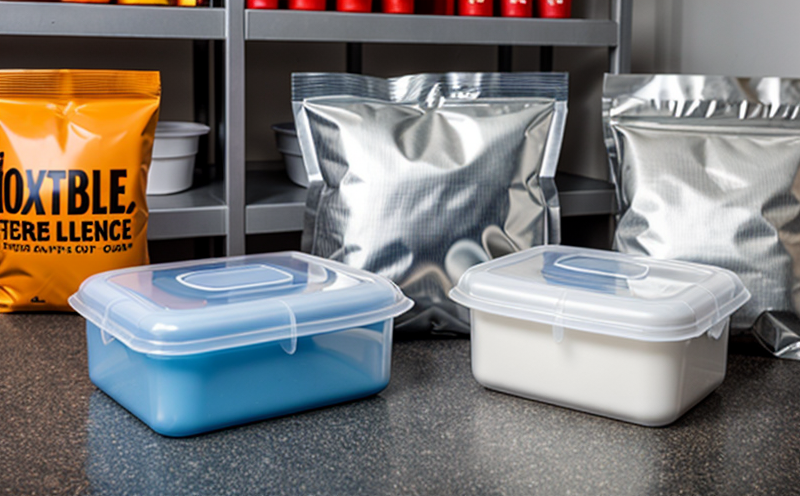ASTM D882-14 Elongation and Strength Testing
The ASTM D882 standard is a crucial method used in the packaging industry to evaluate the mechanical properties of flexible materials, such as films, bags, and sheets. This test measures both tensile strength and elongation at break for these materials, providing critical insights into their durability and performance under stress.
The process begins with selecting an appropriate specimen that accurately represents the material being tested. Specimens are cut to specific dimensions dictated by ASTM D882-14, ensuring consistent results across multiple tests. The testing machine applies a controlled force until the sample breaks, recording both the maximum load and the distance it stretches before failure.
Understanding the parameters of this test is essential for quality managers, compliance officers, R&D engineers, and procurement professionals involved in the development and selection of packaging materials. This information helps ensure that the materials meet industry standards and are capable of withstanding the stresses they will encounter during use.
The results from ASTM D882-14 testing provide a clear picture of how flexible packaging materials behave under load, which is vital for ensuring product safety and regulatory compliance. Compliance officers can rely on these data points to verify that their chosen materials adhere to international standards such as ISO 9001, EN 13427, and ASTM D882-14.
In addition to its role in quality assurance, this testing method also supports research and development efforts by providing engineers with valuable data on material performance. This information can guide the creation of more robust packaging solutions tailored to specific applications or market demands.
| Industry Applications |
|---|
| Film manufacturing |
| Bag production |
| Packaging design and development |
| Regulatory compliance checks |
The data generated from ASTM D882-14 testing plays a significant role in ensuring that flexible packaging materials meet the necessary requirements for safety, performance, and sustainability. By incorporating this test into their quality control processes, companies can enhance their reputation as reliable suppliers of high-quality products.
- Film manufacturers use these tests to improve the mechanical properties of their materials
- Bag producers rely on ASTM D882-14 results to ensure consistent product performance
- Packaging designers leverage this information when creating new packaging solutions
- Regulatory bodies and compliance teams depend on accurate test data for verification purposes
The importance of ASTM D882-14 testing cannot be overstated, especially considering its wide-ranging applications across various sectors. From improving product performance to ensuring compliance with international standards, this method remains a cornerstone in the packaging industry.
Industry Applications
- Film manufacturing
- Bag production
- Packaging design and development
- Regulatory compliance checks
| Applications |
|---|
| Film manufacturing: Ensuring consistent mechanical properties of films used in packaging. |
| Bag production: Verifying the strength and flexibility needed for bag design and construction. |
| Packaging design and development: Providing critical data to enhance the performance characteristics of new packaging solutions. |
| Regulatory compliance checks: Ensuring that materials meet required standards and specifications. |
The ASTM D882-14 test is particularly beneficial in these areas, where it helps manufacturers produce safer, more efficient, and sustainable packaging solutions. The data obtained from this testing method enables companies to optimize their processes while maintaining high-quality standards.
Competitive Advantage and Market Impact
The ability to accurately measure the mechanical properties of flexible materials through ASTM D882-14 testing offers significant competitive advantages in the packaging industry. Companies that invest in this type of analysis can differentiate themselves by offering superior products that better meet customer needs.
By demonstrating a commitment to quality and compliance, firms establish trust with their customers and regulatory bodies alike. This reputation enhances brand loyalty and opens doors to new markets where stringent standards are enforced.
The data provided by ASTM D882-14 testing also supports continuous improvement initiatives within organizations. Engineers can use the insights gained from these tests to refine existing products or develop innovative materials that push the boundaries of what is possible in flexible packaging technology.
Use Cases and Application Examples
The ASTM D882-14 test finds extensive application across various industries, including food and beverage, pharmaceuticals, cosmetics, and consumer goods. Here are some specific use cases:
- Food and Beverage Industry: Ensuring that packaging materials can withstand the rigors of transportation without compromising product integrity.
- Pharmaceutical Industry: Verifying that containers protect medication from external factors like humidity, temperature, and light.
- Cosmetics Industry: Guaranteeing that beauty products are stored safely within their packaging to maintain quality and extend shelf life.
- Consumer Goods Industry: Providing durable and reliable packaging for everyday items such as electronics or toys.
In each case, ASTM D882-14 testing ensures that the chosen materials perform optimally under real-world conditions. This consistency is crucial for maintaining brand reputation and meeting consumer expectations.





